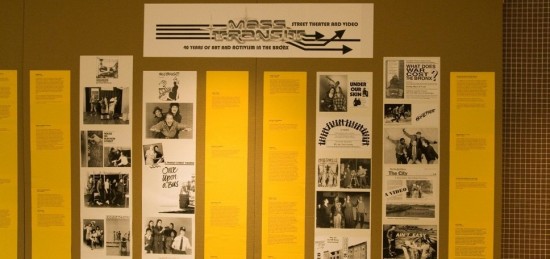
Bronx-based acting company marks ’40 years of art and activism’
Four high school students stand in a line, complaining about how their school treated them.
“Any morning when you get off the bus, you can find zillions of police vans
around your school,” says one, “and 60 or 70 extra cops setting up temporary scanners, and all the students in long lines trying to get through the detectors
without being late to class.”
The students were actors, performing a short play about the growing police presence in public schools and the brutality students sometimes experience at the hands of school-based cops. The play, “Guilty Until Proven Innocent,” was the centerpiece of a party at Hostos College to celebrate the 40th anniversary of the Bronx’s longest-running theater troupe, Mass Transit Theater and Video.
Like “Law and Order,” Mass Transit’s shows are ripped from the headlines—or, in this case from a report of the New York Civil Liberties Union called “Criminalizing the Classroom” that included the testimony of students who charged the police in their schools with harassment, intrusive searches and physical abuse.
From the beginning, the troupe, which is headquartered at the Kingsbridge Heights Community Center, has brought socially conscious street theater to Bronx audiences, especially young, minority audiences in low-income communities, drawing on issues like education, racism, poverty, violence, homelessness and war.
“We started with an issue or concern that affected people within our community and created a storytelling platform to share it,” said Lyn Pyle, the co-founder and director of Mass Transit, who got her start in political theater at Berkeley when she was a student at the University of California.
Pyle believes that all of the issues that Mass Transit addresses illustrate the importance of taking an active role in the community and working together on common concerns for a greater good.
“Ain’t Easy,” which finished a three-year run in December, was based in part on the true story of a young man who killed a classmate and was sent to a maximum-security prison in upstate New York. The incident made Pyle more interested in teaching youth the importance of working together on ways to resolve conflict without violence.
“It spoke to the kids through real world situations and in a language that connects to their experience,” said Jeffrey Garrett, who brought his students from the Bronx Academy of Letters to a performance.
Mass Transit started at an Earth Day event at Union Square in 1970. “What we wanted to do was find people’s stories, listen to them, and play them back in a theatrical form that would help people come together,” recalled Jerry Cofta, a co-founder of Mass Transit, who moved to New York City from Milwaukee to study acting in Greenwich Village.
Presenting issues through theater leads “young people to focus on our message in a different way,” said Aisha Norris, 28, who played a younger version of herself in Ain’t Easy. “It’s not a one on one conversation or a preaching session—it’s entertainment. Students get to reflect and own the way that it affects them.”
“They have a message that needs to be heard,” says Bill Aguado, former President of Bronx Council on the Arts, which has provided several grants to the company over the last five years.
“Whether it’s about housing, healthcare, employment, we don’t have the media talking about it the way Mass Transit talks about it; we certainly don’t have politicians talking about it,” Aguado said.
A version of this story appeared in the June issue of The Mott Haven Herald.
